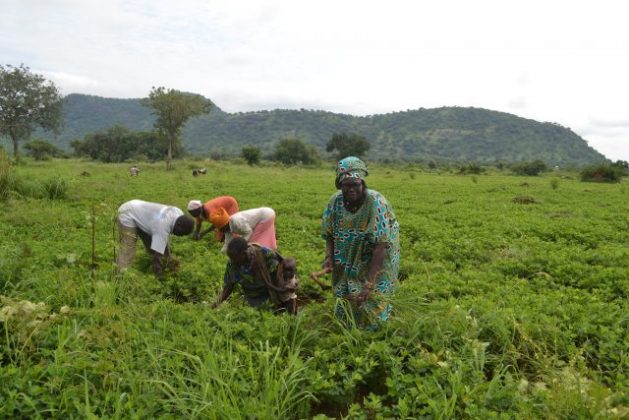Choice and Opportunity for African Farmers Will Transform Africa

NAIROBI, Dec 07 (IPS) - A hungry man is not a free man. He cannot focus on anything else but securing his next meal.
So proclaimed the late Kofi Annan.
In 2003, Kofi Annan and a like-minded group of African leaders recognized hunger as a complex crisis on the continent.
They saw the eradication of hunger as not just an end in itself - but the first step towards sustainable development and progress, requiring the transformation of African agriculture.
In order to address this, three momentous events occurred at that time. In 2003, the Comprehensive African Agriculture Development Programme (CAADP) was launched to provide a policy framework for the transformation of African agriculture.
In 2006, the Alliance for a Green Revolution in Africa (AGRA), the organization I lead, was established to turn these ideas into reality. We are founded on the belief that the only way to do this is at scale - and yet with a focus on the farmer.
And the Africa Fertilizer conference was held, to increase access to crop nourishment - identified as the weakest link in the farming chain.
These measures have reaped rewards.
Across Africa, we have directly reached millions of farmers with increased access to technology, investment in research, financial support or training.
Significant investment was put into access to inputs - especially improved seeds, and soil health management technologies.
For instance, we have helped establish over 110 African seed companies, with some 700,000 tonnes of seed now available to 20 million farmers. Countries like Ghana and Mali had no seed suppliers, and now have an average of six each.
Across our programme countries, a network of 30,000 agri-preneurs now serve farmers.
Healthy soil is fundamental to a productive global food system. However, many smallholder farmers do not have means to prevent or address soil degradation problems. As the world commemorates the World Soil Day, we are encouraged that our soil fertility management techniques are helping reverse decades of soil depletion wherever we work.
We have taken the lead in providing evidence to governments on the value and challenges of subsidies being used in agriculture. We advocate for national policies that benefit smallholder farmers. We support upgraded storage facilities, better market information systems, stronger farmers’ associations, and more credit for farmers and suppliers.
There is still much to do, however. There are approximately 45 million farmers on the continent – African governments and investors must reach all of them if we are to see an end to poverty and hunger.
There are also new challenges. Climate change has the potential to reverse the continent’s hard won gains.
Desertification threatens productive lands. Locusts, armyworm and diseases like the Maize Lethal Necrosis wipe out the livelihoods of hundreds of thousands. Currently, COVID-19 is pushing tens of millions more into malnutrition, while farmers see their choices diminished.
As a proud African, I share Kofi Annan’s optimism and conviction. Africa will prevail, it can eliminate poverty.
I know that a major way of making this happen is through smallholder farmers. I have personally seen smallholders change at scale in Rwanda when government puts its weight behind transformative programs.
As a catalyst for change, AGRA is on track. The eleven countries we support have all advanced in the last ten years through hard work and investment. With ten years to go to meet the Sustainable Development Goals, it is important now to reflect on progress, and positioning for future gains.
Inclusive agriculture transformation is not a quick fix. It requires a long-term focus. We estimate US $25-35 billion a year of investment is needed to transform the continent’s agriculture, while an unparalleled coalition for change is required.
Ultimately, we need African solutions to African problems. When an African farmer has access to better technology and finance, they see improved productivity, food security and income.
Most of the big mistakes in development have happened when external actors have foisted their ideas and ideologies on the continent. This is why AGRA focuses on its unique position as an African institution.
African farmers deserve the same opportunities enjoyed by farmers in Europe and North America. They do not want to be stuck with 40-year-old seed varieties. When given the chance, we have seen adoption rates of 90% of new seeds in countries like Nigeria and Burkina Faso.
On a recent visit to Kiambu in Kenya, women farmers explained to me how they are happy to spend more on seeds that mature in half the time, increasing yields.
In these difficult times, there has never been a greater need for agricultural transformation. Through COVID-19, our farmers have shown great resilience, and AGRA has been on hand to support this.
To achieve Kofi Annan’s vision, we certainly need further support and investment for farmers. We must also learn as we go forward and be humble.
Our focus must always be on the needs, capabilities and choices of smallholder farmers themselves – this must be our ‘North Star’ objective, for agriculture is nothing without the farmer.
Dr. Agnes Kalibata is the President of The Alliance for a Green Revolution in Africa (
© Inter Press Service (2020) — All Rights ReservedOriginal source: Inter Press Service
 Global Issues
Global Issues